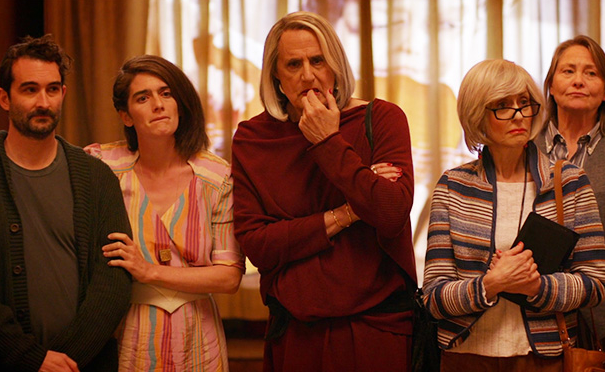As Jill Soloway continues to develop the hopelessly fucked up characters and family dynamic of Transparent, it’s only natural that the trajectory of the plot would boldly decide to get all the more macabre. The first episode, “Elizah,” is in direct contrast to the season two opener, “Kina Hora,” which featured all members of the Pfefferman clan present and accounted for at Sarah’s (Amy Landecker) wedding to Tammy (Melora Hardin)–which, inevitably, didn’t actually happen.
But with season three, a Maura-specific (Jeffrey Tambor) plotline brings to the forefront just how self-involved the protagonist is. In spite of having the approval and acceptance of her family after the season one bomb she dropped on them about identifying as a woman, as well as a fulfilling relationship with Vicki (Anjelica Huston), Maura admits that she feels fundamentally unhappy. Searching for meaning through aiding others overcome her similar persecution, Maura’s volunteer work for the hotline at the LGBT center becomes obsessive when she starts talking to a troubled trans woman who she ends up searching for at the mall in order to ensure she hasn’t caused any harm to herself. In her haste to get there, however, Maura ends up forgetting her wallet and “steals” a Gatorade she can’t pay for after drinking. Feeling faint and ill, Maura passes out and is taken to the hospital–unfortunately not Cedars Sinai.
The issues of identity crisis that are omnipresent in the Transparent storyline continue to be in full swing as Maura awakens in the hospital bed and insists the name “Mort” on the hospital board be changed to her proper, current moniker. A visit from her sister, Bryna (Jenny O’Hara), who remains one of the few who will never accept Mort as Maura, further aggravates her condition.
Throughout episode one, the narrating presence of Rabbi Raquel (Kathryn Hahn) serves to accent the overarching theme of season three: in this life, we have to be our own messiah–’cause ain’t nobody gonna be showin’ up to rescue us.
With this idea firmly established, the path of the narrative sets the stage for Ali’s up and down relationship with lothario professor Leslie (Cherry Jones)–overtly based on Eileen Myles. At first, Ali wants desperately for Leslie to care more than she does, or at least is willing to show. After she ends up committing “infidelity” (she admits, “I cheated on her by raping myself. Actually, I raped my hand with some weird chick’s vagina”), Ali uses it to establish just how into her Leslie is. But when Leslie starts coming on too strong, Ali can’t help but start to get freaked out and lose interest.
Meanwhile, as Shelly (Judith Light) obsesses over her one-woman show, “To Shel and Back,” which she feels will bring joy and comfort to anyone who has ever had to deal with her husband suddenly telling her he wants to be a woman, she acts oblivious to Buzz’s (Richard Masur)–her live-in boyfriend–overt knack for taking advantage of her. For instance, his help with producing her show proves largely useless as he merely finances the entire thing on her credit card, then claims he’s doing it to get the points to get the entire Pfefferman clan on a cruise together after he returns the equipment.
While Shelly deals with the idea of having to fly solo, yet again, Josh (Jay Duplass) is on his own rollercoaster of emotions as he grapples with the death/more than likely suicide of his former babysitter flame, Rita (Brett Paesel). Though he briefly reconnects with Rabbi Raquel at a special Shabbat service organized by Sarah, she doesn’t agree to accompany him on a road trip to scatter Rita’s ashes. His desperation to feel a part of a family–any family–shines through on his journey to Colorado to inform Colton (Alex MacNicoll) of his mother’s death. Along for the ride is trans stripper/Maura’s friend, Shea (Trace Lysette), who ends up being part of the emotional wreckage caused by Josh’s only certainty in life being that he wants someone to care about. It doesn’t really matter who, which is why most people always tend to recoil from him.
Then, of course, there is the Pfeffermans’ long lost pet turtle, Nacho, who manages to find his way out of the walls of their property after being lost for roughly twenty years–a metaphor for each family member’s desperate quest to find their way back home, to a stasis of familiarity before it all went awry. All in all, the Pfeffermans still don’t know what they want, but they know it’s not this.






















